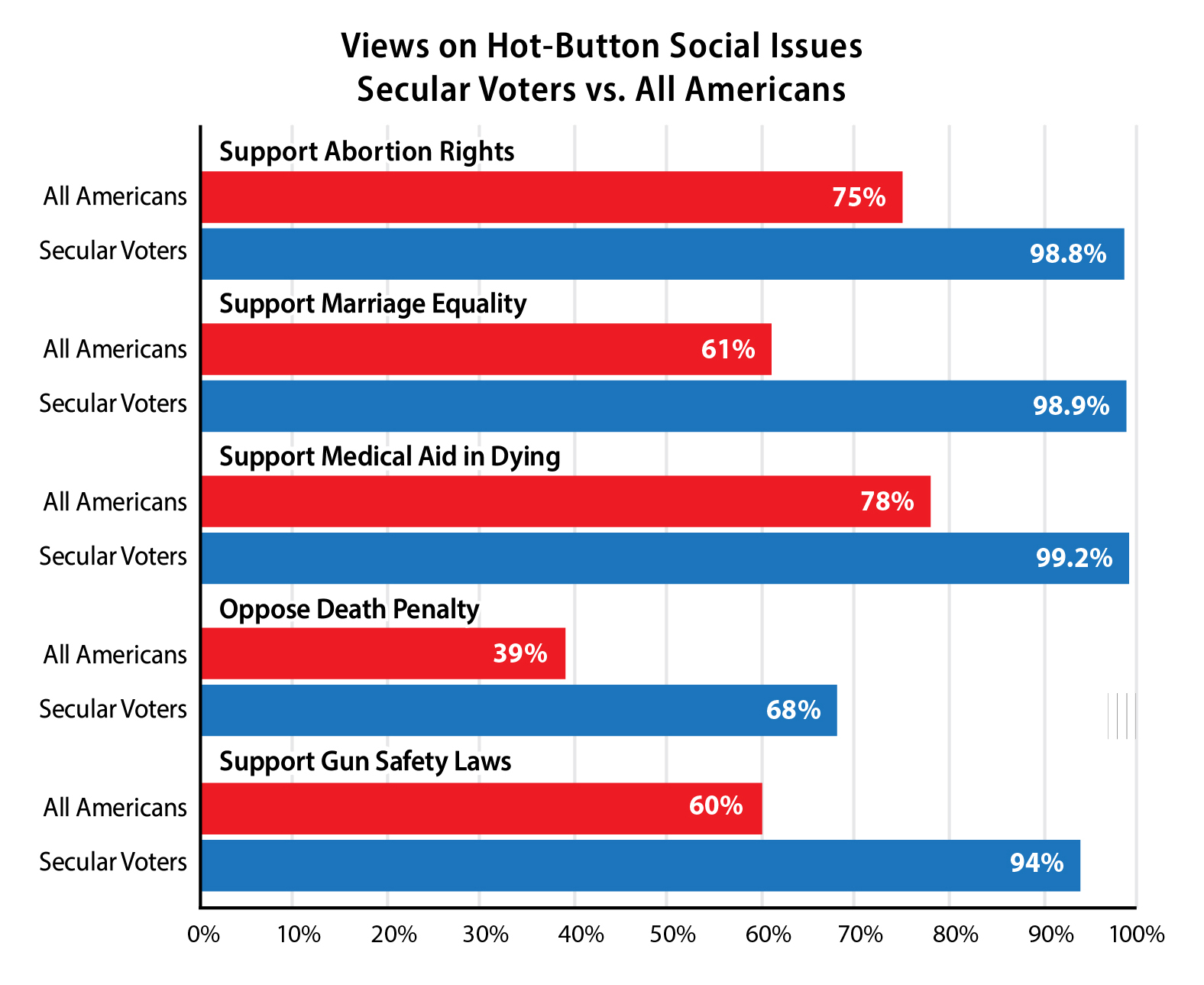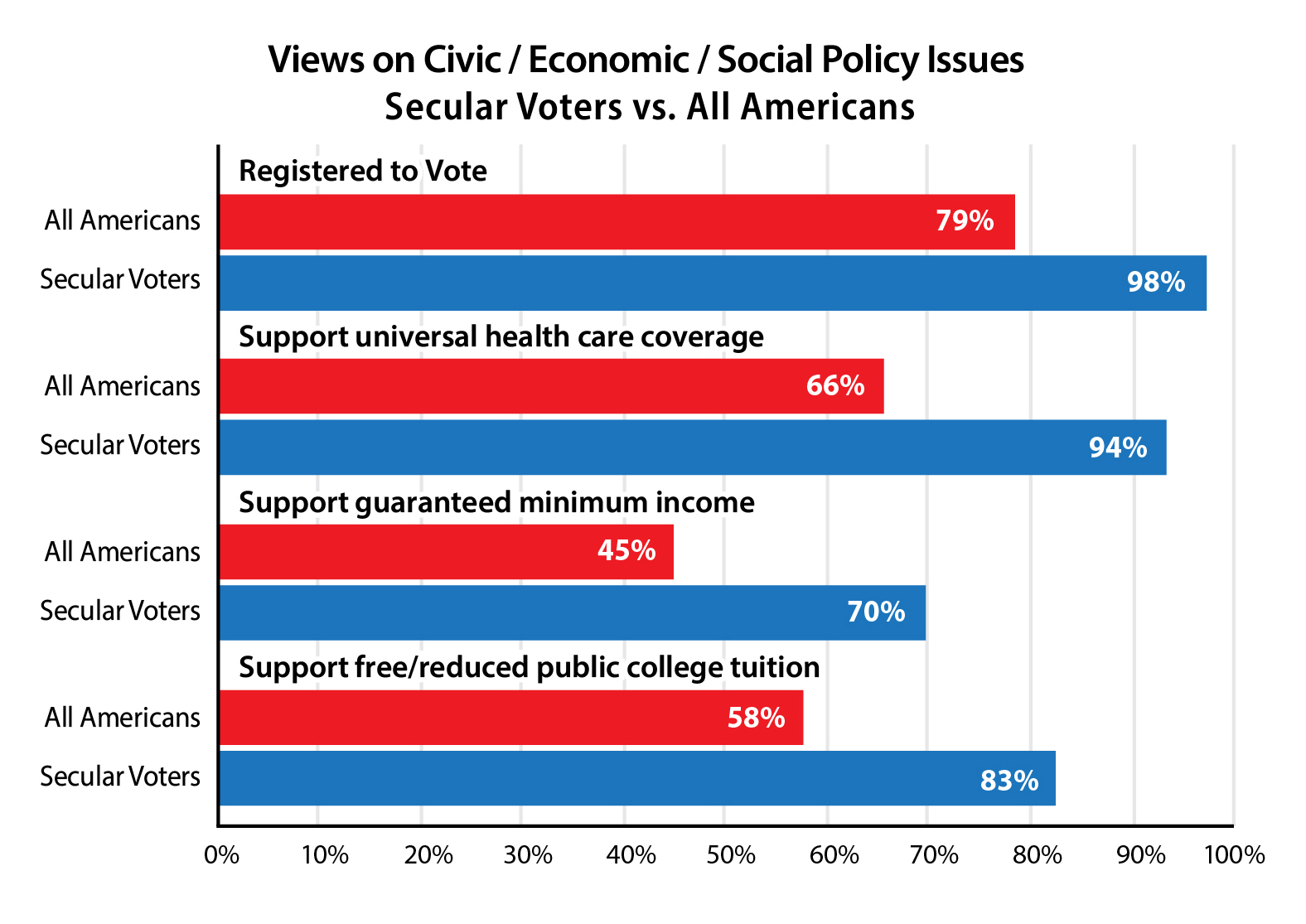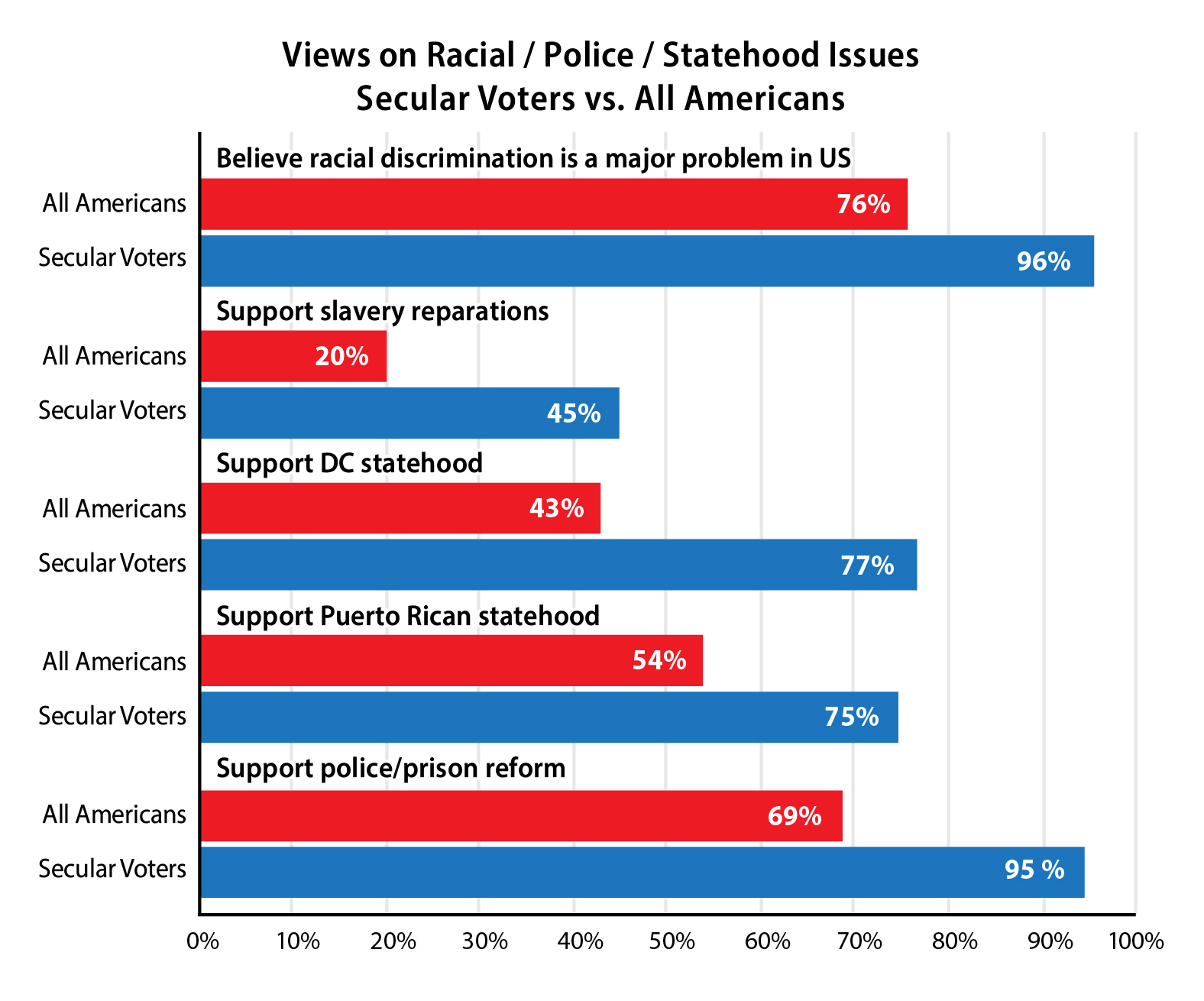
What do nonreligious American voters want?
The Freedom From Religion Foundation has just released a major new secular poll of more than 12,000 registered voters who are atheists or agnostics, providing a fascinating profile of American nonbelievers and their views on the major social issues of the day. All respondents are members of the Freedom From Religion Foundation, a national state/church watchdog that is the largest freethought association in the United States — with more than 32,000 members.
Major surveys consistently show that 26 percent of the adult population are either atheists, agnostics or identify as “Nones,” having no religious identification, a demographic that now outnumbers Catholics (at 20 percent).
“We Nones — religiously unaffiliated adults in America — are now the largest ‘denomination’ by religious identification,” says FFRF Co-President Annie Laurie Gaylor. “Yet most candidates and media outlets focus their time on traditional religious groups, and ignore this major demographic. We’re releasing this voter poll so that our views will be heard, too.”
Fully 98 percent of the respondents are registered voters, 70 percent of whom identify as atheist, 9 percent as humanist or freethinker and 7 percent as agnostic (with 4.5 percent preferring another term). Average age is 64. More than half (56 percent) identify their political voting pattern as Democratic, 17 percent as “progressive” and 16 percent as “independent” (with 1.9 percent Libertarian, 1.4 percent Republican and 3 percent Socialist and a smattering of other).
The data show with startling clarity that nonbelievers embrace a humanistic social policy in vastly higher numbers than the general U.S. population.
Their support for women’s rights, reproductive rights and LGBTQ rights is overwhelming, as well as for medical aid in dying:
- 99.6 percent support women’s rights (compared to 79 percent of all adults).
- 98.8 percent more support legal abortion and Roe v. Wade (compared to 75 percent of all Americans).
- 98.9 percent support marriage equality (compared to 61 percent of all Americans) and civil rights in general for the LGBTQ community (compared to nearly 70 percent of all Americans).
- 99 percent support the right to die with dignity (compared to 73 percent of Americans).
Nonreligious voters in far greater numbers support policies like gun safety laws, police/prison reform, universal health care and free college:
- 95 percent support police/prison reform (compared to from 40 to 67 percent of all Americans in favor of police reform and 71 to 91 percent in favor of basic prison reform).
- 94 percent support universal health care coverage (compared to 66 percent of all Americans).
- 94 percent support “rational gun control” (compared to approximately 60 percent of all Americans).
Nontheists also show far more support than the general population for some hotly debated reform, such as:
- 82.9 percent support reduced or free public college tuition (with 11 percent undecided and only 6 percent opposing), compared to 58 percent of all Americans.
- 69.9 percent support a guaranteed minimum income while 54 percent of Americans as a whole oppose it.
- 94 percent of secular voters support universal vote by mail, compared to 69 percent of all Americans.
- Two-thirds (68 percent) oppose the death penalty (with 17 percent undecided, and 15 percent supporting it), compared to 39 percent of all Americans.

The disparities continue on the hot button topic of racial justice:
- 96 percent of secular voters believe racial and ethnic discrimination is a big problem in the United States (compared to approximately 76 percent of Americans).
- 45 percent support reparations for slavery (a plurality of seculars, with 31 percent undecided), compared to only one in five Americans overall.

One of the greatest disparities between nonbelieving Americans and Americans in general is found in the response on statehood for the District of Columbia, with 77 percent of those in the survey supporting statehood for the District of Columbia (17 percent undecided), compared to 43 percent of all Americans. And a higher percentage of atheist/agnostic voters also supports statehood for Puerto Rico: 74.9 percent, compared to 54 percent of all Americans.
Some other results are not surprising, coming from a minority segment that is particularly supportive of the separation between state and church:
- 98.7 percent support public education and 94.5 percent oppose tax vouchers to public schools.
- 98 percent of secular voters believe “churches should play by the same rules as secular organizations.”
- 97 percent believe humans are causing climate change (compared to 50 percent to 71 percent of all Americans, depending on polls) and 89.8 percent of secular voters believe religious denial is harming the response to climate change.
- 93.5 percent believe asylum seekers and immigrants should not be banned based on religion (up-to-date comparison data not readily available).
- 93 percent oppose churches receiving COVID-19 bailout money. (Maybe it’s surprising it wasn’t 100 percent!)
- 68 percent believe “Congress should take action, such as by enlarging the U.S. Supreme Court, to correct the blocking of Judge Merrick Garland’s Supreme Court nomination in 2016" (with 23 percent undecided). (Comparison data not readily available.)
These secular voters put their money where their mouths are, with 49 percent financially supporting civil rights/ racial justice-equality organizations, 48 percent financially supporting reproductive rights, 52 percent supporting environmental issues and 50 percent charities to help the needy. Each of the following is supported financially by about a third of secular respondents: women’s rights organizations, animal rights, education and the arts.
Overwhelming numbers support legislative initiatives such as the proposed Scientific Integrity Act (99 percent) and repealing or amending the Religious Freedom Restoration Act or other bills making Christians and religious Americans a favored class (96 percent). Secular voters also overwhelmingly support requiring religious organizations to follow the same financial disclosure requirements as secular groups (99 percent), to pass the No Ban Act barring religious discrimination in immigration (93 percent), and to create secular parity in addiction recovery programs (95 percent).
They also overwhelmingly have written and emailed their elected officials (77 percent) and more than a third have protested at a rally or picketed.
“Overall, nonbelievers are obviously caring, compassionate, involved and engaged individuals,” notes Dan Barker, FFRF co-president, “who clearly recognize that this world is what matters. Not believing in a god doesn’t mean you don’t believe in values. We are the real values voters.”
View raw data on social policy and related questions.
View press release and raw data results on FFRF’s basic membership questions, not related to social policy.
From June through August 2020, FFRF surveyed its 32,000 current members, with more than 12,200 respondents overall participating across the nation. A question on being a registered voter was answered by 12,130 FFRF members, with 98% saying they are registered voters. The social policy questions were answered by 11,904 of the overall respondents. Since the last membership survey in 2015 (with 8,000 responses), FFRF found that the numbers of registered voters in its ranks grew 4 percent, from 96 to 98 percent (which compares to 79 percent of all Americans).
FFRF is a nonpartisan educational nonprofit that does not endorse candidates for office.